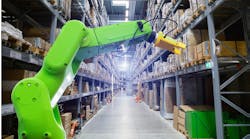Download this article in PDF format.
Artificial intelligence (AI) has been around since the 1950s, but it was ChatGPT that put the advanced technology on the average person’s radar screen a couple of years ago. Since then, AI has been leaving its mark in a wide range of applications, processes and industries. The world’s supply chains are especially ripe for more AI, which can help with a lot of different aspects of supply chain, logistics, fulfillment and transportation management.
“AI has the potential to revolutionize supply chain operations by improving decision-making and efficiency,” Maxime C. Cohen and Christopher S. Tang write in “The Role of AI in Developing Resilient Supply Chains.” Citing a recent McKinsey & Co. survey, the authors say AI in supply chain management can yield substantial cost savings for organizations.
“Specifically, AI can add value to supply chain planning, including production, inventory management, and product distribution. Companies can also leverage AI-powered tools to process vast amounts of real-time data and improve the accuracy of demand forecasting,” they write. “With more precise demand forecasts, AI-enabled tools can help firms optimize production and inventory plans across various locations and select the most cost-effective logistics solutions.”
More specifically, Cohen and Tang say early adopters of AI-enabled supply chain management have reduced logistics costs by 15%, improved inventory levels by 35% and enhanced service levels by 65%. They see AI as a support tool for human labor in supply chain roles versus something that will displace jobs.
“Despite the potential of AI in supply chains, AI should not decrease employment in supply chain management,” the authors point out. “Rather, it should create new opportunities to mitigate potential risks associated with adopting new technologies.”
AI + Machine Learning = Resilient Supply Chains
In one recent example of how companies are leveraging the power of AI in their supply chains, electronics manufacturer Lenovo recently created Supply Chain Intelligence (SCI). The AI-powered solution continuously analyzes supply chain data to identify potential issues and resolve them in real time.
The company said it “embarked on an ambitious project” to infuse its supply chain with real-time analytics and AI. By doing so, Lenovo wanted to break down silos between systems and stakeholders and deliver end-to-end visibility into every part of the supply chain.
“With conventional business models and systems orchestrating our supply chain, we found that siloed operations and limited access to real-time information were restricting our ability to preempt and mitigate supply chain risks,” the manufacturer said in a recent article.
Using AI and machine learning, SCI continuously analyzes supply chain data to identify potential issues and propose solutions in real time. By integrating previously-siloed functions into an end-to-end digital workflow, SCI is helping Lenovo respond faster to address supply chain risks and deliver on-time shipments to its customers.
Now, when Lenovo customers order online, SCI provides real-time delivery estimates based on the availability of components. The AI-enabled supply chain application also provides smart logistics insights and provides accurate visibility into the status and location of orders in the logistics network.
“The first thing I do every day is open up SCI,” said Russell Shimp, Lenovo’s executive director, WW PC customer fulfillment. “The beauty of SCI is that all data comes from the same source—enabling strong collaboration and alignment across our team as well as Lenovo’s entire supply chain.”
Up Next: Generative AI
Another evolution of AI has seized the spotlight over the last year or so and is now poised to make a potentially even bigger mark on the world’s supply chains. According to EY, 40% of supply chain organizations have already invested in generative AI that creates new content (i.e., numerical data, images, text, audio or video) based on data on which it has been trained.
For example, companies are training models on their own data sets and using generative AI to find ways to improve productivity and efficiency. Predictive maintenance is another area where generative AI can help determine the specific machines or lines that are most likely to fail in the next few hours or days.
“As investors pour cash into the technology, executives are racing to determine the implications for operations and business models,” EY points out. “For those who diligently pursue innovation guided by strategy and an understanding of the limitations — not by an impulse to chase after the latest shiny object — [generative AI] can prove to be an agile co-advisor and multiplier in strengthening supply chains.”








